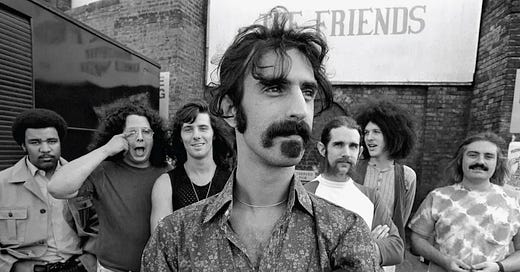The Mothers of Invention
The Mothers of Invention, often simply referred to as The Mothers, were an American rock band founded by the enigmatic and innovative musician Frank Zappa.
This band had a profound impact on the world of music and is known for its genre-blending, satirical, and avant-garde approach to rock and roll. Here is a detailed history of The Mothers of Invention:
1. Formation (1964): The band's roots can be traced back to 1964 when Frank Zappa, a guitarist and composer, formed a group called The Mothers with drummer Jimmy Carl Black and bassist Roy Estrada. They initially played R&B covers and experimented with a variety of musical styles.
2. Change to The Mothers of Invention (1965): In 1965, they changed their name to The Mothers of Invention and released their debut album, "Freak Out!" This album was groundbreaking, as it was one of the first double LPs in rock music history and featured a wide range of musical styles, from rock and doo-wop to avant-garde and experimental compositions. Lyrically, Zappa's songs often had a satirical and social commentary aspect.
3. Lineup Changes and Growth (Late 1960s): The band went through various lineup changes, but some notable members included multi-instrumentalist Ian Underwood, saxophonist Bunk Gardner, and drummer Art Tripp. The band's music continued to evolve, incorporating elements of jazz, classical music, and freeform improvisation.
4. Concept Albums and Critical Acclaim (Late 1960s): The Mothers of Invention released several influential albums during this period, including "Absolutely Free" (1967) and "We're Only in It for the Money" (1968). These albums were notable for their satirical take on the counterculture and their bold musical experimentation. "We're Only in It for the Money" was a direct parody of The Beatles' "Sgt. Pepper's Lonely Hearts Club Band."
5. 1970s: More Lineup Changes and Further Innovation: The 1970s saw additional changes in the band's lineup and a move towards more complex and intricate compositions. Albums like "Hot Rats" (1969) and "Apostrophe (')" (1974) demonstrated Zappa's prowess as a guitarist and composer.
6. Disbandment (1975): The Mothers of Invention officially disbanded in 1975, but Frank Zappa continued to create music as a solo artist and with various other musicians. Despite the band's dissolution, the legacy of The Mothers of Invention endured.
7. Legacy: The Mothers of Invention were pioneers in fusing different musical genres and were early proponents of progressive rock and experimental music. Frank Zappa, in particular, became known as a musical iconoclast who fearlessly pushed the boundaries of rock and composition.
8. Influence: The band's influence on subsequent generations of musicians is immeasurable. Their groundbreaking approach to music and their satirical lyrics inspired a wide range of artists, from Captain Beefheart to Talking Heads and beyond.
9. Frank Zappa's Solo Career (Late 1970s - Early 1990s): After the disbandment of The Mothers of Invention, Frank Zappa released numerous albums, including "Joe's Garage" (1979) and "Sheik Yerbouti" (1979). He continued to explore a vast array of musical styles and lyrical themes.
10. Frank Zappa's Passing (1993): Tragically, Frank Zappa passed away on December 4, 1993, after battling cancer. His death marked the end of an era in avant-garde music, but his work remains a touchstone for musicians and fans of unconventional and innovative music.
The Mothers of Invention and Frank Zappa's work challenged the conventions of popular music, and their influence on the world of rock and experimental music is still felt today. Frank Zappa's extensive catalog and The Mothers' groundbreaking albums continue to be celebrated and studied for their innovation and daring artistic vision.


